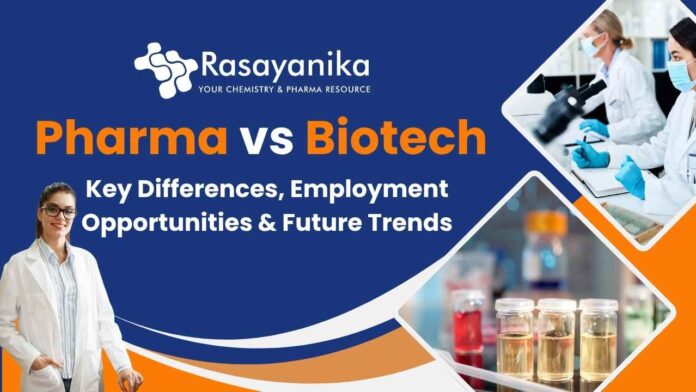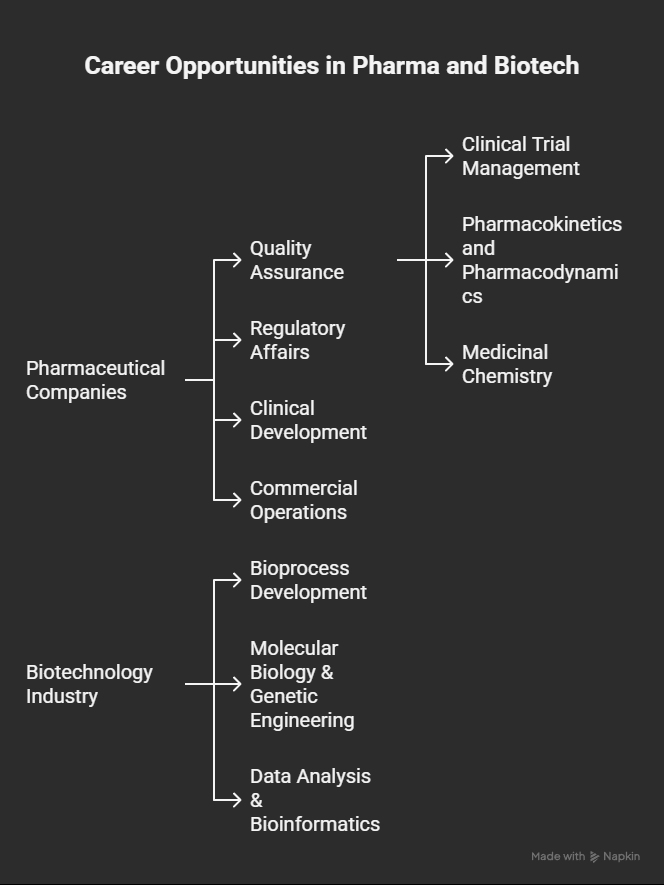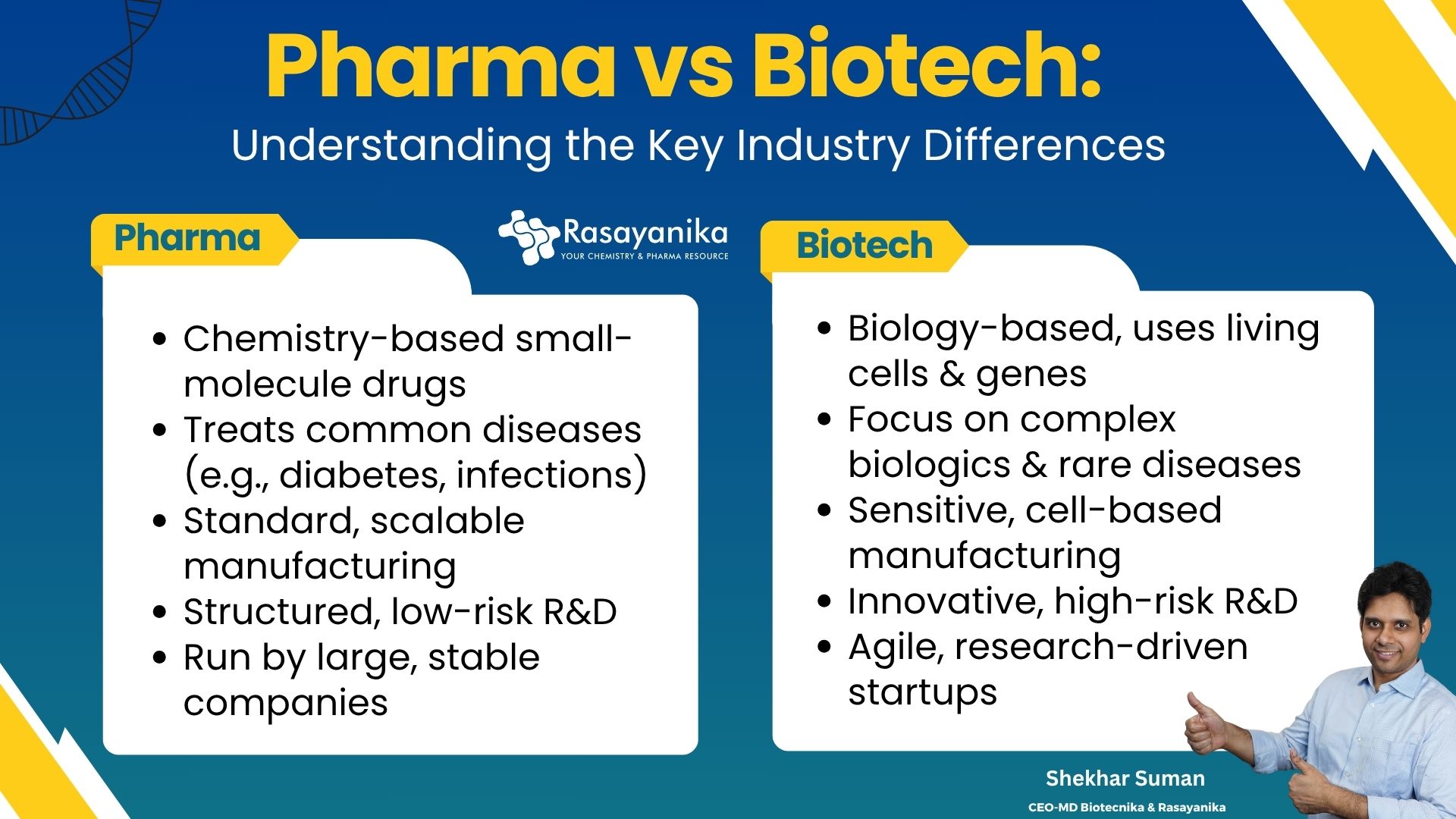Pharma vs Biotech Careers – Understanding the Key Industry Differences
Ananya, a Biotechnology graduate, is scrolling through her phone. Two job openings had popped up, one in a primary Pharmaceutical industry, and the other at a fast-growing Biotechnology startup. Both sounded exciting to Ananya. But she started thinking. What’s the real difference between Pharmaceutical and Biotechnology?
Weren’t they both the same? Don’t they both save lives?
As she dived deeper, she realized that while they shared a common goal, the paths they took were worlds apart, from the Science they used, to how they developed products, to the culture in their laboratory.
If you’ve ever found yourself asking the same question, you are not alone. This article breaks down the major differences between Pharmaceuticals and Biotechnology, helping you understand their unique identities, strengths, and roles in shaping the future of Healthcare.
1. Definition and Origins
Pharmaceutical Industry
The Pharmaceutical industry primarily deals with the development and commercialization of chemical-based drugs. These are small molecular compounds synthesized in laboratories and well-designed to treat a wide range of diseases. The Modern Pharmaceutical Industry dates back to the 19th century and includes companies such as Merck, Bayer, and Eli Lilly. The primary focus of pharmaceutical companies has traditionally been on producing mass-market drugs for common conditions, such as pain, fever, infections, and chronic diseases.
Biotechnology Industry
The Biotechnology companies work on living organisms, Biological systems, or derivatives to develop products that improve healthcare. Biotechnology emerged more prominently in the 1970s, primarily following advances in R&D (Research and Development), such as Recombinant DNA Technology and the development of the first Genetically Engineered Insulin. Companies in this field often focus on using Cellular as well as Biomolecular processes to create innovative therapies, specifically for Autoimmune conditions, cancer, and rare diseases.
2. Core Science and Technology
Pharma
The pharmaceutical industry is grounded in Chemistry and Pharmacology. Drug discovery typically involves the identification and optimization of chemical compounds that interact with specific Biological targets, such as receptors or enzymes. This process includes Medicinal Chemistry, Molecular Modeling, and high-throughput screening. These synthetic compounds are formulated into various forms, including pills, capsules, and injections.
Biotech
Biotechnology is rooted in Biological Science. It relies on Molecular Biology, Immunology, Cell Biology, and Genomics. Instead of synthesizing drugs chemically, the Biotechnology industry genetically modifies living cells to produce complex molecules, such as Monoclonal Antibodies, Recombinant Proteins, and gene therapies. These Biologics mimic natural processes and often target diseases at a Molecular or Genetic level.
3. Drug Types and Products
Pharmaceutical Drugs
The pharmaceutical industry mainly produces small-molecular drugs. These are primarily simple in structure and can be synthesized chemically. They are usually administered orally in the form of tablets or capsules, such as Aspirin (a pain reliever), Metformin (a diabetes medication), and Atorvastatin (a cholesterol-reducing drug).
Biotech Products
The Biotech industry researches and develops Biological Therapeutics, which are large, complex molecules derived from living organisms. These include insulin (made using Recombinant DNA), Monoclonal Antibodies such as Humira for autoimmune diseases, and gene therapies for rare genetic conditions. Due to their complexity, Biologics are mainly administered via injection or infusion.
4. Research and Development (R&D)
Pharma Research & Development
Pharmaceutical R&D is a systematic process involving:
- This process involves screening thousands of compounds
- Testing of Biological activity and safety in Preclinical models
- Conducting human Clinical trials (Phases I-III) as well as taking Regulatory approval and post-marketing surveillance (Phase IV)
- Pharma research and development tend to focus on chronic and widespread conditions, offering high-volume returns over time.
Biotech Research & Development
Biotech R&D is innovation-driven and often involves greater risk. It involves:
- It involves Genetic manipulation of cells
- The Biotech industry uses advanced research technologies such as CRISPR (Clustered Regularly Interspaced Short Palindromic Repeats), RNA interference, and omics
- Personalized approaches to therapy based on individual Genetic profiles
- The Biotech industry may take a platform-based approach, developing multiple products from a single core technology.
5. Manufacturing Processes
Pharma
Pharma manufacturing is largely standardized. It involves chemical synthesis, purification, and formulation. The processes are relatively easier to scale and ensure batch-to-batch consistency. Facilities are optimized for producing large volumes at low cost.
Biotech
Biotech manufacturing is more complex and sensitive. It uses living cells (bacterial, yeast, or mammalian) in bioreactors to produce proteins or other biologics. These cells must be cultured under strictly controlled conditions. The process is susceptible to variability and requires rigorous quality control and validation procedures.
6. Regulation and Approval
Pharmaceutical Regulation
Pharma products undergo strict evaluation by regulatory agencies such as the FDA (Food and Drug Administration) or EMA (European Medicines Agency). The process involves:
- Filing a New Drug Application (NDA)
- Submitting data from clinical trials
- Detailing manufacturing processes and controls, all approval is based on efficacy, safety, and quality.
Biotech Regulation
Biotech products, especially Biologics, require a Biologics License Application (BLA). Due to the complexity of these products, regulators focus heavily on:
- The cell lines and processes used
- Immunogenicity and long-term safety
Manufacturing consistency
This approval can be more time-consuming and may also require extensive post-marketing surveillance.
7. Company Structure and Culture
Pharma Companies
Pharma companies are typically large and globally established. They have:
- Extensive R&D infrastructure and dedicated sales and marketing teams
- Robust supply chains
Examples include Pfizer, GlaxoSmithKline, and Novartis. These companies often operate with a risk-averse, process-oriented mindset.
Biotech Companies
Biotech firms are usually smaller, nimble, and innovation-focused. They may:
- Specialize in a narrow therapeutic area and collaborate with major companies for commercialization.
- Examples include Amgen, Genentech, and Moderna. These firms often encourage a culture of experimentation and Scientific exploration.
8. Funding and Investment
Pharma Funding
Pharmaceutical companies usually finance their research and development using revenue from established products. They invest in lifecycle management strategies such as new formulations or indications for existing Drugs. They also acquire or license promising Biotechnology assets to replenish their pipelines.
Biotech Funding
Biotechnology companies generally depend on VC (Venture Capital), Government Grants, as well as Public Markets for their funding and investments. Early-stage Biotechnology companies are highly dependent on achieving Research milestones to secure financing. Strategic partnerships and IPOs (Initial Public Offerings) are quite common for funding.
09 Market Focus and Therapeutic Areas
Pharma Markets
In the Pharmaceutical sector, therapeutics are targeted to treat highly prevalent diseases, providing significant benefits and a cure to patients in need. Some of these include Cardiovascular Disease (CVD), infectious diseases, and diabetes. However, the cost of such therapeutics could become a challenge once the patent expires and reaches the open market.
Biotech Markets
Biotechnology companies primarily focus on addressing unmet medical needs and serving niche markets. These include Oncology, Immune Disorders, and rare diseases. Orphan drug status premium pricing helps offset the high cost of development.
10 Intellectual Property (IP)
Pharma IP
Pharmaceutical Intellectual Property focuses primarily on patents for Chemical compounds. These are easier to define. Once patents expire, generic manufacturers enter the global Pharmaceutical market, leading to significant price reductions.
Biotech IP
Biotechnology IP encompasses patents on Cell Lines, platform technologies, and Biologic products. Due to their complexity, Biologics face less competition even after exclusivity ends. Biosimilars aren’t exact copies and require separate Regulatory and Compliance pathways.
11. Employment Opportunities
Pharma Career Opportunities
Pharmaceutical companies offer career roles in Quality Assurance, Regulatory Affairs, Clinical Development, and commercial operations. Some opportunities include:
- Clinical Trial Management
- Pharmacokinetics and Pharmacodynamics
- Medicinal chemistry
Biotech Careers Opportunities
The Biotechnology Industry seeks expertise in
- Bioprocess development
- Molecular Biology & Genetic Engineering
- Data Analysis & Bioinformatics
- Biotechnology careers often involve cross-disciplinary collaboration as well as rapid innovation cycles.
12. Future Trends
- Precision Medicine: The Biotechnology and Pharmaceutical Industries are moving toward more personalized treatments customized to Molecular & Genetic profiles.
- Digital Transformation: Artificial Intelligence (AI), Machine Learning (ML), as well as real-world Data are transforming both Biotechnology and Pharmaceutical R&D.
- Sustainability: Biomanufacturing as well as Green Chemistry are gaining more importance in both the Chemical & Biotechnology industries.
- Global Access: Many industries are working to make advanced therapies more accessible for the healthcare sector globally.
While pharma and Biotechnology differ in Science, business models, and innovation approaches, they are not adversaries. Instead, they form complementary pillars of modern healthcare. Pharmaceuticals help scale up processes, provide experience, and ensure global reach, while Biotechnology contributes innovation, agility, and scientific breakthroughs. As medicine becomes increasingly personalized and technologically advanced, the collaboration between these sectors will grow stronger.
Whether you are a student considering a career, an investor exploring career opportunities, or a patient benefiting from the next medical advancement, understanding the distinctions and overlaps among the Pharmaceutical as well as Biotechnology industries plays a vital role in navigating the future of Healthcare.


















































